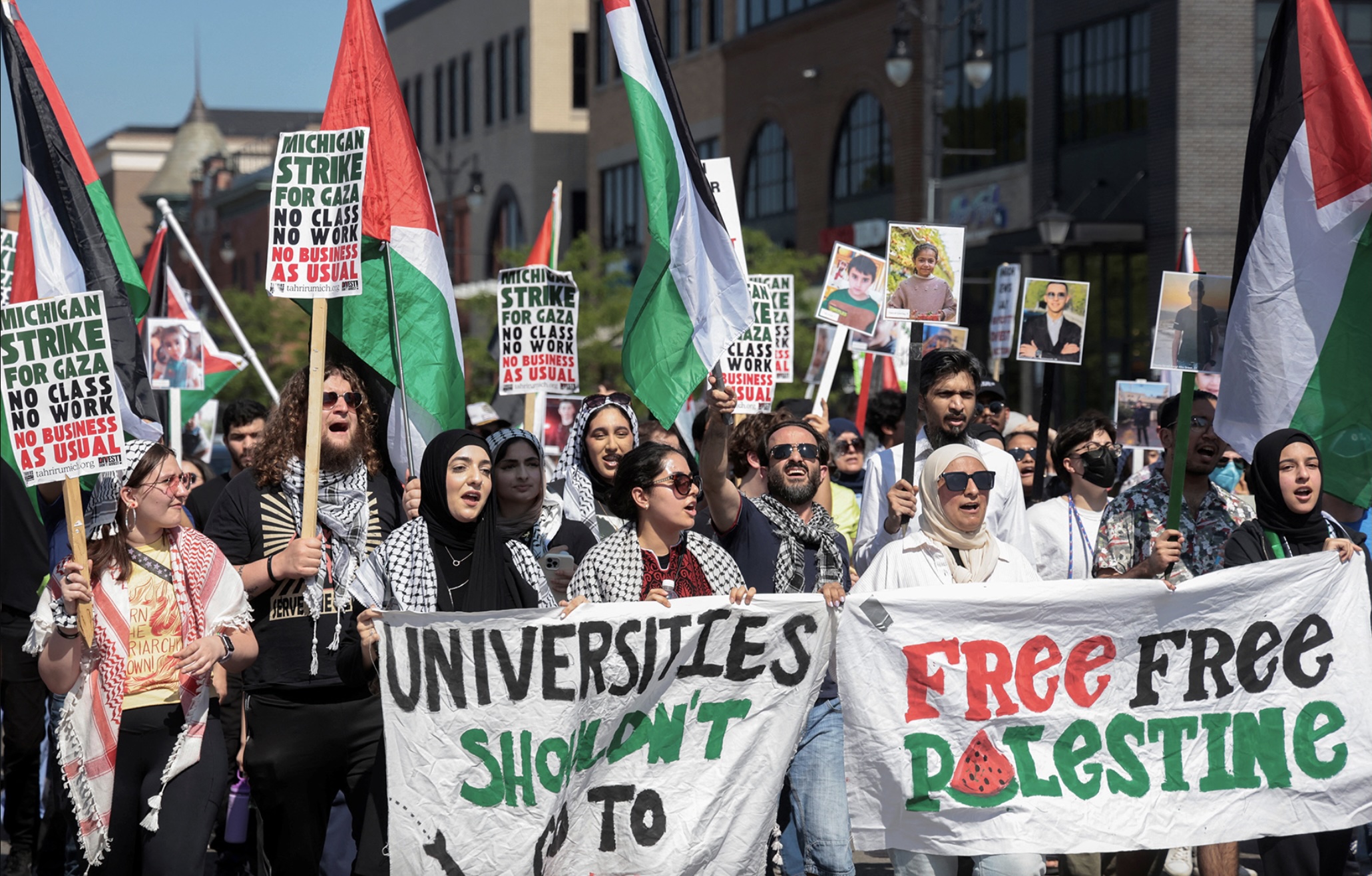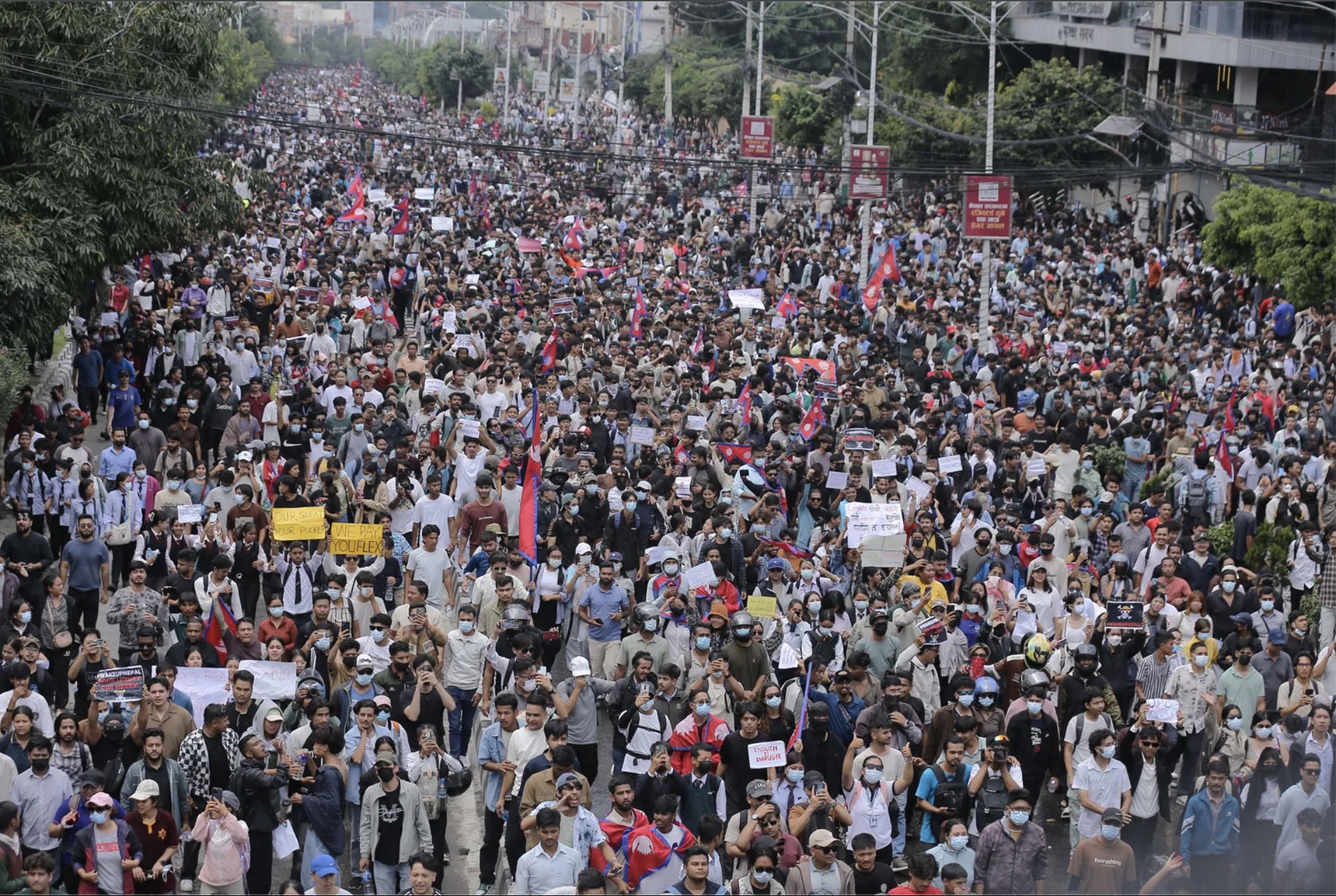International Student Activism Reaches Dearborn

The success of student-led protests in Nepal that led to government change has sparked a new sense of hope and inspiration among the youth in America to persist in the ongoing movements to create real change in America.
The protests in Nepal began on September 4 following a widespread social media ban which aggravated the youth in Nepal. In response to the protests, then Prime Minister K. P. Sharma Oli resigned on September 9. On September 12, former Supreme Court Chief Justice Sushila Karki was sworn in as the interim prime minister, becoming the country’s first female head of government.
In Syria, there has been major shifts in the country following the end of the Assad regime as well as a new interim government, ongoing sectarian violence, and shifting regional dynamics involving foreign powers. Last year in December, opposition forces, led by Hay’at Tahrir al-Sham or the HTS, experienced rapid advancement which led to the capture of Damascus. These events led to the end of the decades long occupational rule of the Assad family. Former president Bashar Al-Assad fled the country to Moscow.
In Bangladesh last summer, the country experienced a major shift in government power as the surge in student-led protests took place. The student-led protests, initially focused on reforming the civil service job quota system, grew into a widespread movement demanding Hasina’s resignation and an end to what critics called her authoritarian rule. As massive crowds gathered outside her official residence in Dhaka, Hasina resigned and fled the country by helicopter on Aug. 5, 2024. The army chief, General Waker-uz-Zaman, announced her resignation and the formation of an interim government. These events led to Hasina’s exile in India.
Growing student activism is also present in Dearborn. Reem Almasri, a student at University of Michigan-Dearborn, studying behavioral sciences and Pre-Law, is the president of the Student Organization for Syria (SOS) at UM-D.
Almasri said, “I started because one of my friend’s sisters was president of the SOS organization at Eastern Michigan University and that was my inspiration to start the SOS organization here at U of M-Dearborn.” The events and fundraisers began during Almasri’s sophomore year, her first event having a turnout of over 200 attendees. Almasri grew even more hopeful seeing the amount of support the new organization received. For this first event, Almasri worked with the Syria Emergency Task Force, an American organization focused on the Syrian cause. The SETF was the organization that helped put sanctions on the Assad regime to lessen the suffering of Syrian citizens. The SETF was very eager to help Almasri and the SOS in their cause and collaborated with them for the first on-campus event. The guest speaker was Omar Alshogre, who openly shared his experience having been tortured and held captive in Syria.
Almasri said, “We have to face it, our parents and grandparents are not going to be here forever; it is up to us, the youth and our generation to fix the world and make a difference because we as well as our children and future generations are going to be the ones left on this Earth.”
Almasri continued, “What happened in Nepal, Syria, and Bangladesh is really inspiring and it gives us hope that there is something that we can do to truly make a difference. Regardless of the state the world is in, which is devastating- but we have to continue to use our voices and our various platforms to make a change.”
Henry Ford College Honors Program student, Ayah Naimi, plans on finishing her associate degree in liberal arts and then transferring to Wayne State University to earn her bachelor’s in law with a minor in social justice. Naimi attended her first protest between the ages of six and eight at City Hall for Gaza. She became increasingly politically involved and aware as she grew older. “I feel like this generation is a lot more vocal and definitely more educated than previous generations and this is due to the given platforms that we have on social media. However, I don’t feel like we are as motivated as people make it seem, especially here in America, due to the American propaganda where we are constantly individualized,” Naimi observes, “Though, it takes generations for individualization to actually happen. When you read the Muqaddimah by Ibn Khaldun, it is considered a great work and is essentially a philosophy piece. In chapter 3, it talks about a group feeling and how empires fall after the third or later generations because they become so individualized and lose hope in the fight against tyranny.”
Naimi further explains that immigrants and children of immigrants in the West are making these changes because they see each other more as a community and as family rather than competition. Naimi questions concepts like “valedictorian” and the competitive and oppositional nature of American culture that pits people against each other, especially people of color, using individual differences that can make the country easier to control.
“Divide and conquer, the ancient strategy,” Naimi states, “This is also why we have borders in the Middle East now, where it used to be the Levant region; now it’s ‘Palestine, Syria, Lebanon, etc.’ Whereas it used to be just groups of people who considered themselves one. They were tribal and community based which is important to consider when you want to do these uprisings like what happened in Nepal.”
From Naimi’s perspective, Nepal is a country that has not been westernized so they have remained strong in their sense of community and view each other as family rather than competition or enemies. Because of this, Nepal was able to overthrow the government once the tyranny became so suffocating because they were not divided as a country. Despite the ongoing protests and fights that the youth of America have put up against the corruption in the government, according to Naimi, “We haven’t been able to ‘pull off a Nepal’ because we are still so divided.”
University of Michigan-Ann Arbor graduate and current medical student, Malak Elayyan, shared her thoughts on student activism and what she herself had experienced during her years of studying at UM-Ann Arbor. “Despite how busy I was in university, trying to graduate fast so I can take a gap year before med school, I stayed very involved in all the student activist movements. I was on the board for Students Allied for Freedom and Equality (SAFE). Through that, I helped organize a lot of educational events, campus discussions, but these were mainly prior to October 7. After October 7, the protests were no longer small but obviously grew tremendously. I was part of the encampment and I attended all of the protests that had such an amazing turnout.” Elayyan further explained the University of Michigan-Ann Arbor has a very vocal and involved student body who are engaged with many political issues, protesting global conflicts as well as local ones.
“The best thing about Ann Arbor is that we have so many cross collaborations between different political organizations run by students on campus.” Elayyan had also observed that the universities and institutions also push back against students who want to remain vocal and active in protests and spreading awareness and it makes it extremely difficult for students to continue and remain strong in their political endeavors. “People’s medical school acceptances have been revoked. In the beginning there was such a high momentum, but so many arrests, felonies, and cases against students have deterred people from remaining active in these activities.” Elayyan recalls situations during peaceful protests at the University of Michigan-Ann Arbor when police pepper sprayed students.
Ahmed Hajj, Henry Ford Early College and Honors Program student further elaborated on the censorship the youth has experienced by comparing the situation to that of Zoramamdani’s race in New York City.
“For example, Zoramamdani, the guy that is currently running for the Democratic nominee for mayor of New York City. He has a citizenship that was naturalized five years ago and yet he is still being threatened with deportation. Donald Trump himself said he was going to take a look at his naturalized forms accusing Zoramamdani of lying about his citizenship,” Hajj explained.
Hajj further talks about a Turkish student, Rümeysa Öztürk from Tufts University who was abducted by ICE. “She was on her way to an Iftaar dinner and was abducted in the middle of the road by masked ICE agents in an unmarked vehicle. The reason for her abduction was because she had written an opinion piece in her school newspaper about Palestine.”
Hajj, Elayyan, Naimi and Almasri are among a growing number of student activists exercising their rights of free speech under the First Amendment of the U.S. Constitution to speak out against government corruption and injustice. They along with countless student and youth activists worldwide gain inspiration from the courageous youth protesters in Syria, Nepal, and Bangladesh.

